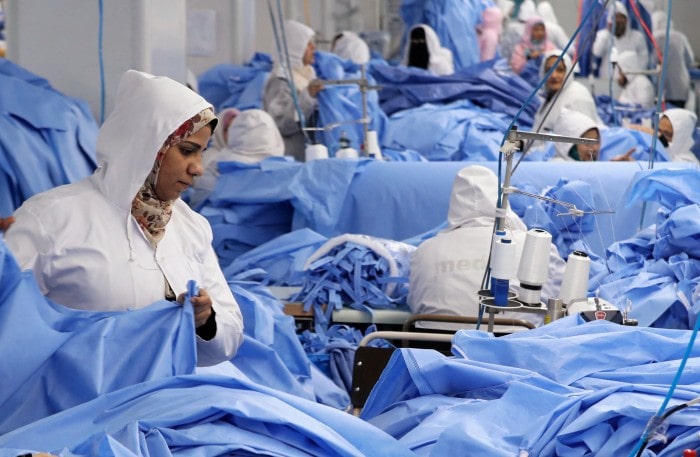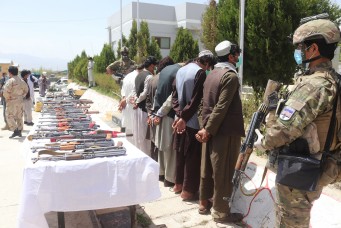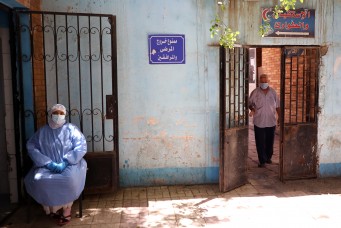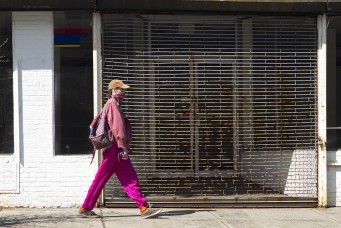COVID-19: An Opportunity for Health and Education
Though the coronavirus pandemic has brought extraordinary challenges, it also presents states and institutions with the opportunity to assess and reform.

Workers are seen in a factory that produces sterilized surgical equipment and medical clothings, as Egypt ramps up efforts to slow the spread of coronavirus disease (COVID-19), in Sadat, Egypt, March 15, 2020. Picture taken March 15, 2020. REUTERS/Mohamed Abd El Ghany
The COVID-19 pandemic has changed the way the world works, produces, learns and communicates. Since March 2020 (and earlier for states like Italy and China), countries have closed their proverbial and literal doors—halting immigration, closing restaurants and cafes, and shifting schools and universities to online learning—in an effort to slow the spread of the virus. However, though these measures have been successful in limiting casualties in countries like New Zealand and South Korea, health systems in many countries have been overwhelmed by an influx of patients requiring critical care.
Dr. Hossam Badrawi, who founded the Nile Badrawi Hospital and has served in the Egyptian Parliament, outlined the challenges faced by the Egyptian healthcare system in a special webinar series titled “Health and Educational Challenges of COVID-19 in Egypt and Beyond”, which was held by the American University in Cairo’s (AUC) School of Global Affairs and Public Policy on April 22. He outlined three sequential priorities for response to the coronavirus: widespread testing; global coordination in preventing transmission across borders; and strengthening the quality of Egyptian healthcare as well as the system’s capacity.
“We don’t have more than 460 ventilators available [in Egypt], and the number of critical beds are very little,” Badrawi said. But, he cautioned against increasing resource quantity without equally strengthening service: “If I say Egypt has 120,000 hospital beds, this does not mean that they can accommodate and treat.”
In considering service delivery, testing is critical. Badrawi noted that Egypt performs only 250 coronavirus tests per day, achingly behind countries like Germany, which was reported to perform over one hundred thousand tests per day in the beginning of April.
Badrawi theorized that the slow rate of testing in Egypt makes the mortality rate of COVID-19 in the country—roughly 6 percent—seem unnaturally high, as a large number of low or moderate-severity cases are likely left unaccounted for.
Associate Provost for Transformative Learning and Teaching Aziza Ellozy, who also participated in the dialogue, cited an unnamed article that theorized that the efficiency of the German response to the coronavirus—which, in addition to rigorous testing, included aggressive contact tracing, an increase in intensive care beds, and laudable adherence to social distancing measures—likely has to do with Chancellor Angela Merkel’s dual role as a scientist and a politician. Indeed, for its nearly 150,000 cases, Germany has seen only five thousand deaths, as opposed to the twenty thousand in neighboring France—which, similarly, has had 158,000 cases. Egypt would do well to integrate the spheres of politics and science more deeply, she and Badrawi stressed.
In this regard, Badrawi acknowledged that politics and science appear to some as diametrically opposed: politics is about public acceptance and manipulating desires instead of evidence-based knowledge and imposing change, he summarized. Yet, “You need the politician to convince, but you need the scientist to direct,” he counterbalanced. Creating a separate room in Parliament where more scientists are taking part in political decisions may lend a different perspective to decision-making, he proposed.
One of Badrawi’s final points on the matter was that one need not be a scientist to think scientifically. Ellozy, in her position as Associate Provost and founder of the University’s Center for Learning and Teaching (CLT), knows this well, and discussed the need to provide students with the tools to sift through scientific or intentionally biased information.
Cultivating such critical skill sets is one of the areas for improvement at AUC—and in Egyptian higher education more broadly—brought to light by the COVID-19 pandemic, Ellozy said. “We want to have learners who can function in this global world”, which requires proficiencies in connectivity and data literacy.
“Digital learning is the way forward.”
AUC was, however, relatively prepared to make the first steps toward this new academic paradigm when COVID-19 began to aggressively spread around the world. Ellozy praised the Provost’s Office for having a contingency plan in place for the physical closure of the University, and cited CLT’s existing focus on faculty integration as integral to quickly providing instructors with the tools to maintain the quality of their tutelage online.
Challenges do remain, however, including the transition to assessing students online. Without working face-to-face, it can be more difficult to proctor examinations, and specialized software may be necessary to monitor student online activity during exam times. But, the coronavirus pandemic has highlighted that traditional examinations may not be the best way of assessing students’ performance, Ellozy remarked. Online learning presents educational institutions with unique flexibility in offering alternative assignments, which should be retained even when in-person instruction is once again possible.
Succinctly put, now is the time for educational innovation. To find ways of maximizing our technological resources, “we don’t need to reinvent the wheel”, Ellozy says. She points to South Africa as a pioneer in using mobile phones for education; companies like Vodacom and Siyavula provide e-learning applications that operate free of data charge, so they are accessible to students across income levels. Moreover, Ellozy notes that the Internet gives us access to resources developed around the world free of charge.
Badrawi looks through a similarly optimistic lens toward the educational prospects borne by the coronavirus. He explained that because of the changes necessitated by the virus, we have discovered potential in Egyptian students, professors, and institutions that would have been left otherwise untapped. With the knowledge that the capacity of young people is so great, Egyptian society—both in the educational system and in other sectors—must rise to a new level.
In his view, the path forward is multi-pronged: high-quality education must be made available to all, which Ellozy adds must include greater Arabic translation. Furthermore, Badrawi outlines a need for educational autonomy, arguing that integration with the state constrains institutional flexibility and power to innovate.
Badrawi nevertheless stresses that a vital responsibility of educational institutions is cultivating the personalities of young people—not just imparting knowledge. With coronavirus-enforced digitization, young people have access to arts and culture that must be brought into the halls of schools and universities.
If such can be done—if students are more holistically cultivated, as opposed to being simply taught to regurgitate—Egypt will have succeeded in breeding a generation of leaders. Therein lies the opportunity of the COVID-19 pandemic: society’s eyes have been opened to the need for global leaders, and it has been brought face-to-face with the resources needed for today’s students to fill the gap.




